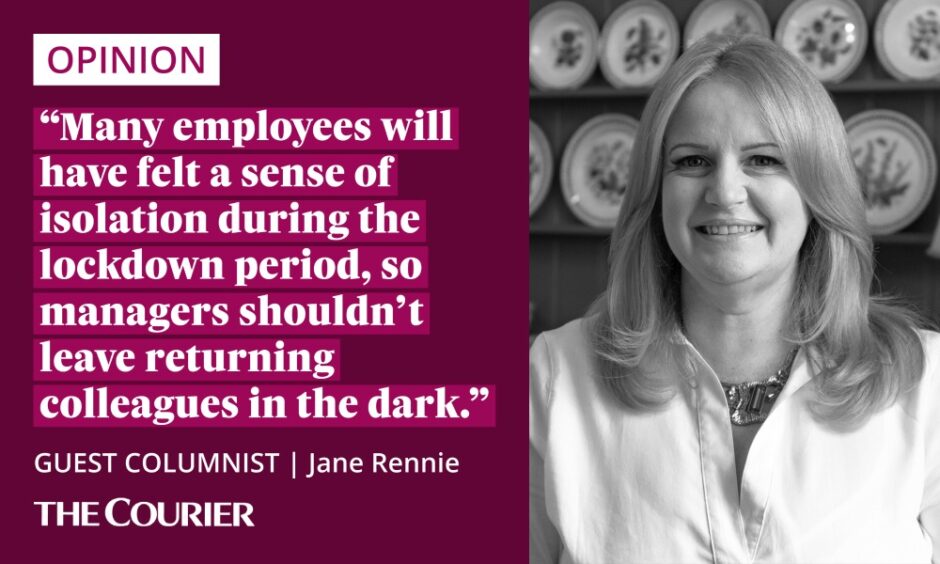The push is on to get more workers back to the office but a major survey last week found most people don’t expect to return full-time.
It’s likely to be one of the biggest societal changes to emerge from the pandemic.
And for staff and bosses it presents major challenges in figuring out who comes back – and when and how.
Jane Rennie founded the Extraordinary Training Company, based in Perth, and she has devised a reboarding programme for making it work. Here’s her advice for employers and employees who are anxious about the next steps.

Throughout the pandemic we’ve needed to be agile and develop training programmes in response to market need, turning our own business completely online seemingly overnight.
In this process, we identified a significant skills gap between those who had been furloughed and who were returning to work, and those who continued to work, albeit remotely.
So, I designed a “reboarding” programme to help businesses successfully bring their teams back to work.
Now that restrictions have eased further, office workers are beginning to make their way back to the office, albeit with different working patterns.
In @TrainingJournal's latest #TJTalks podcast our CEO @TETCJane talks about #resilience within the #hospitality industry, remote worker loneliness & the challenges of running Scotland's largest ever online #training programme.https://t.co/AwJtQJII8B #leadershipdevelopment
— The Extraordinary Training Company (@ExtraordinaryTC) August 27, 2021
Some employees will be delighted and enthusiastic to return.
However, this change, particularly for those who have been working from the safety of home for 18 months, has the potential to unsettle.
Naturally some people will be anxious and reluctant to return.
All of them will need the ongoing support of their leaders and managers.
For employers there is a job to be done to make this transition as smooth as possible.
Reboarding means starting over
Reboarding used to be reserved for those returning from extended leave or long-term sickness.
Not anymore.
In the shadow of a global pandemic, businesses big and small are thinking about how they are going to bring back their employees as the economy tries to recover and resume business in a new world.
Research has shown the thing people have missed most throughout lockdown is human connection
Reboarding is the process of integrating people back into the culture of a business or organisation, following an extended period of time away.
It is designed to re-familiarise them, bring them up to speed on relevant changes and empower them to get back to business as usual.
Simply put, it’s like starting a job all over again.
It’s an opportunity to re-engage employees, helping them to be passionate again about their role and the business they work for.
Mental health is paramount
With an increase in mental health issues due to the pandemic, getting every aspect of the employee experience right is critical.
And while the reboarding process may happen at different times for different businesses and organisations, planning should start now.
For employers it’s an opportunity to “rehire” your employees – a chance to create a strong bond and really understand how they feel.
Think beyond the welcome back and seek to re-engage, re-energise, and refocus teams.
The reboarding work session I run focuses on issues such as trust, communication, resilience, and readiness for change.
Essentially, there are six key pieces of advice I can offer to ensure employees are effectively and successful brought back into the workplace.
1. Clarify expectations
These are likely to have shifted during lockdown to flex with people’s personal commitments and circumstances.
Managers need to encourage transparent conversations about expectations for future success.
2. Start with the Why
Remind people of the organisation’s purpose, mission, vision, and values.
Remind them why they started working for the organisation in the first place.
And clearly communicate about expected behaviours as new ways of working are adapted.
3. Check in with staff often
Many employees will have felt a sense of isolation during the lockdown period, so managers shouldn’t leave returning colleagues in the dark.
Connect with employees regularly and early on.
4. Clear the path for reboarding
Managers should make it easy for staff to do their job by avoiding overwhelm.
A lot will have changed since staff were last in the office, so managers should keep them informed.
However, resist the temptation to share too much too soon.
Better to drip-feed relevant information, rather than throwing everything at staff at once.
5. Create human moments
Research has shown the thing people have missed most throughout lockdown is human connection.
So managers should build a social environment that inspires personal connections, socially distanced if appropriate.
6. Supporting staff beyond reboarding
Once the reboarding process is over, continue with one-to-one check-ins.
That means conversations to understand how staff are finding the transition back to the workplace and discovering what else they might need is important.
Successful reboarding will only happen if plans are clearly communicated from the beginning.
Be sure to start that process as soon as possible.
Jane Rennie is founder and CEO of The Extraordinary Training Company.










